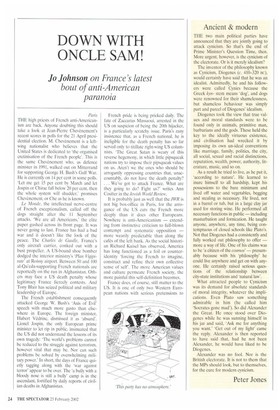Ancient & modern
THE two main political parties have announced that they are jointly going to attack cynicism. So that's the end of Prime Minister's Question Time, then. More urgent, however, is the cynicism of the electorate. Or is it merely idealism?
The inventor of the philosophy known as Cynicism, Diogenes (c. 410-320 uc), would certainly have said that he was an idealist. Admittedly, he and his followers were called Cynics because the Greek kynstem means 'dog', and dogs were renowned for their shamelessness, but shameless behaviour was simply part and parcel of Diogenes' idealism.
Diogenes took the view that true values and moral standards were to be found only in animals, primitive man, barbarians and the gods. These held the key to the ideally virtuous existence, and civilisation had wrecked it by imposing its own un-ideal conventions like marriage, family, politics, the city, all social, sexual and racial distinctions, reputation, wealth, power, authority, literature, music, and so on.
As a result he tried to live, as he put it, 'according to nature'. He learned to inure himself to all hardship, kept his possessions to the bare minimum and lived off water and vegetables, begging and stealing as necessary. He lived, not in a barrel or tub, but in a large clay jar used for storing wine. He performed all necessary functions in public — including masturbation and fornication. He taught anyone, anywhere, any time, being contemptuous of closed schools like Plato's. Not that Diogenes had a consistently and fully worked out philosophy to offer — more a way of life. One of his claims was to be 'a citizen of the cosmos' — presumably because with his 'philosophy' he could live anywhere and get on with anyone. He certainly raised serious questions of the relationship between city-state institutions and 'natural law'.
What attracted people to Cynicism was its demand for absolute standards of moral integrity, whatever the implications. Even Plato saw something admirable in him (he called him 'Socrates gone mad'). So did Alexander the Great. He once stood over Diogenes while he was sunning himself in his jar and said, 'Ask me for anything you want.' Get out of my light' came the reply. Alexander is then reported to have said that, had he not been Alexander, he would have liked to be Diogenes.
Alexander was no fool. Nor is the British electorate. It is not to them that the MPs should look, but to themselves, for the cure for modern cynicism.
Peter Jones






































































 Previous page
Previous page